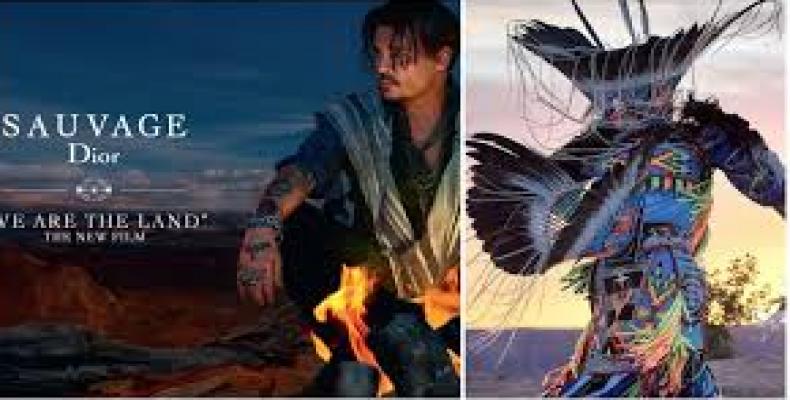Paris, September 1 (RHC)-- Dior has pulled posts promoting its ‘Eau Sauvage’ men’s perfume after a new ad for the fragrance triggered a viral response. The racist ad featured a Native American dancing to Johnny Depp’s guitar.
A clip of the promotion, called ‘We are the Land’, was posted on Dior’s social media accounts on Friday. The teaser shows Depp, clad in a poncho, strumming on an electric guitar as a Native American, decked out in full ceremonial garb, performs a tribal dance.
In an apparent attempt to preempt Internet outrage over ‘cultural appropriation’, Dior noted that the spot was filmed with the help of Native American consultants. In a caption to a now-deleted Instagram post, the company wrote that the film was made in “close collaboration” with Americans for Indian Opportunity (AIO) “in order to respect Indigenous cultures, values and heritage.”
However, what some would argue was the brand’s attempt at preemptive damage control did little to help Dior escape the Internet’s wrath, spurred by accusations of cultural appropriation and outright racism.
Many took issue with the French name of the fragrance, ‘Sauvage’ which can be translated into English in several ways, including ‘wild’, ‘unspoiled’, ‘unsociable’, ‘savage’, and ‘fierce’.
The majority of those incensed over the campaign, however, presumed the most obvious -- pointing to the uncanny similarity between the word ‘sauvage’ and the English ‘savage’.
The fashion brand teased the ad, which stars actor Johnny Depp, on Twitter on Friday as “an authentic journey deep into the Native American soul in a sacred, founding and secular territory”. It has since deleted the tweet and all references to the campaign on social media.
An extended video promoting the $150 fragrance shows Depp walking amid the red rocks of south-western Utah, stacking rocks to mark his path, as a Native American fancy war dancer Canku One Star, a Rosebud Sioux member, performs on cliff and a young woman, portrayed by Canadian actor of First Nations descent Tanaya Beatty, follows Depp from a distance.
Scholars and critics have responded that the campaign is racist and a clear cut case of appropriation. “It is so deeply offensive and racist,” said Crystal Echo Hawk, CEO of the media watchdog group IllumiNative. “I don’t know how anyone in 2019 can think a campaign like this can go down well.”
Dior’s Sauvage line of perfumes isn’t new -- it first launched in the 1960s -- but the brand’s continued use of the name alongside Native American imagery has drawn particular criticism. The French name of the fragrance line translates to “wild” or “savage” in English.
“These types of tropes, these types of narratives about Native people as savages they do real harm,” Echo Hawk said. “And fuel racism.”
“Honestly, I couldn’t help but laugh because this drips with irony – every single aspect of it,” said Dallas Goldtooth, an organizer with the Indigenous Environmental Network, an environmental and economic justice group. “But I’m also upset and angry at the same time.”
The video “romanticized Native Americans as relics from the past”, Goldtooth said. “It’s deplorable that Dior thought this was appropriate.”
So the fact that “Sauvage” is on some “we are the land” BS is not surprising, but as always I find it deeply disturbing when brands force Native people to make the choice between stereotypes and misrepresentation, or utter invisibility.
In a press release, the French fashion giant noted that the film was created in collaboration with Native American consultants and the advocacy group Americans for Indian Opportunity, with the aim of “moving away from clichés in order to avoid the cultural appropriation and subversion that so often taints images representing Native peoples”.
But Dior’s attempt to work with Native Americans fell short, critics said. “It feels like they tried to do it ‘right’ and involved some great people – but it’s still an ad for a notoriously racist company and a product called ‘Savage’,” wrote Adrienne Keene, a scholar and founder of the blog Native Appropriations.
Depp has previously drawn criticism for his portrayal of Tonto, a Native American character in Disney’s 2013 remake of The Lone Ranger.


